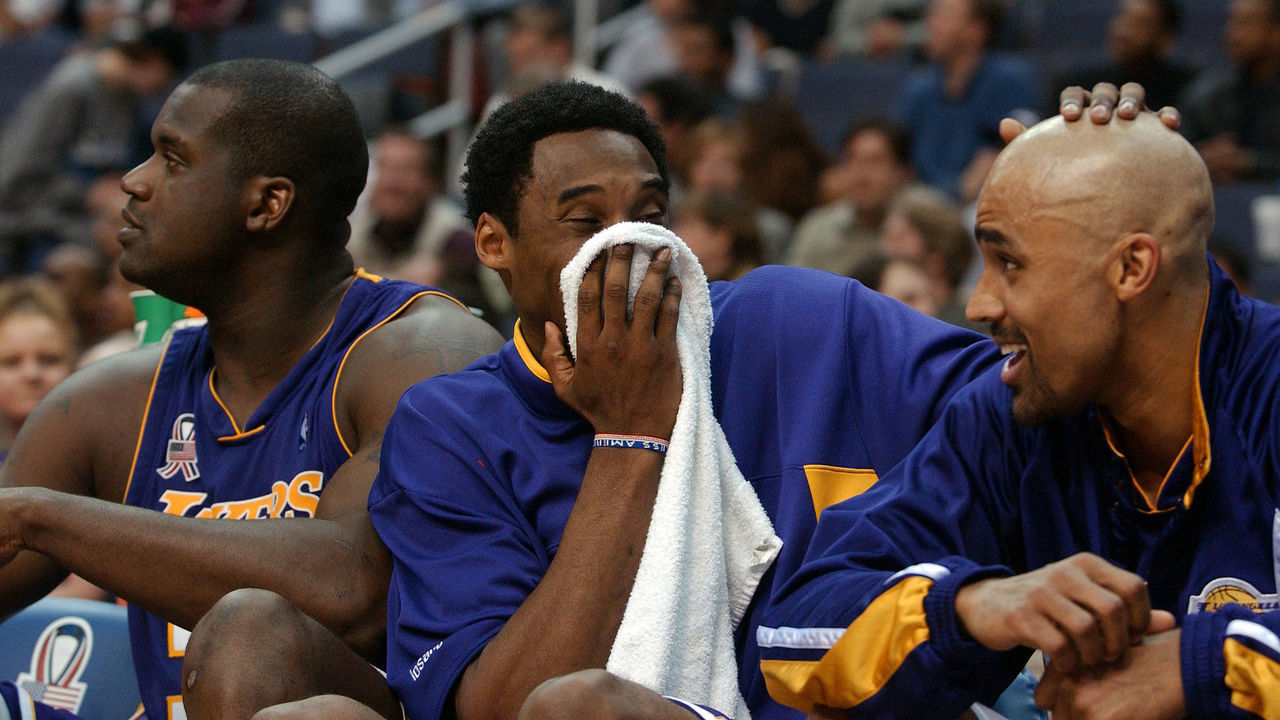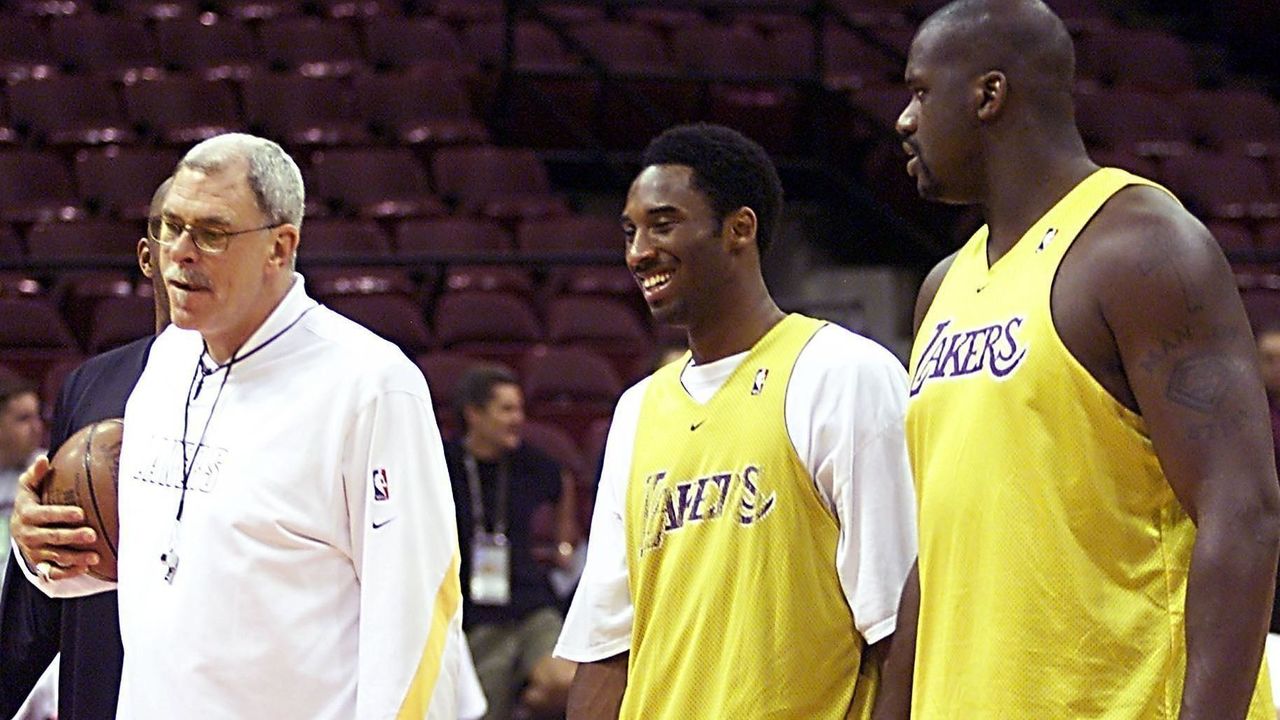Q&A: Jeff Pearlman on Shaq, Kobe and Phil's 'Three Ring Circus'
Some 20 years later, the Los Angeles Lakers' short-lived dynasty led by Phil Jackson, Shaquille O'Neal, and Kobe Bryant still resonates with basketball fans worldwide. Much of that, clearly, is rooted in the compelling characters and soap opera-like dysfunction that ultimately led to its breakup.
Author Jeff Pearlman, who has written extensively about famed-yet-flawed teams such as the 1990s Dallas Cowboys and the 1986 New York Mets, is out with a new book covering the Lakers between 1996-2004: "Three-Ring Circus: Kobe, Shaq, Phil, and the Crazy Years of the Lakers Dynasty."
Pearlman completed the book late last year, before the death of Bryant. He added an author's note at the beginning to acknowledge that. He spoke with theScore about the overall process last week.
This interview has been edited for clarity.
theScore: You finished this book before Kobe died, and I heard an anecdote you mentioned about being disgusted when someone texted you something to the effect of, "This ought to help your book." But how tricky is this as people are still mourning his death and the book covering some of his career's negative aspects such as the Colorado sexual assault case?
Pearlman: It sucks. I wrote a book years ago about Walter Payton. Sports Illustrated ran an excerpt about three weeks before he died … and the backlash was just intense. Everybody was like, 'Why are you doing this? Why would you write this about Walter Payton?' It was pretty devastating.
So, I'm a little bit in a crouch position. And I'm just saying the same thing: Look, this is a sliver, a portion of his life. I didn't write some quick-hit Kobe Bryant book after he died to make money. But some people don't hear that stuff, so I'm certainly expecting some blowback. People are protective of his legacy, and his death meant a lot to people. And, living (in Southern California), you see it. I understand the rawness of the emotion.
theScore: Many observers almost viewed Kobe as having two careers – with Shaq and post-Shaq. But the Colorado case (around the same time as the Shaq break up) appeared to change his personality from a hubris-filled youngster to a more stoic, ruthless veteran. Do you think that is accurate?
Pearlman: I don't know if his core personality changed. I think he was always kind of the same guy, and that's not an insult. His understanding of how to deal with the public may have changed.
I think a big thing for him, I really do, was when he got hurt (in 2013), and he wasn't quite as good anymore. He lost his explosiveness, and the Lakers stunk, and he was on the team with Nick Young and D'Angelo Russell … I think that was really good for him. In a lot of weird ways, I think it actually helped him. All athletes who have a successful transition after sports have a moment of reckoning where they realize this is their sports mortality.
He was always a ridiculously hard worker. The one thing about Kobe Bryant was it almost rubbed people the wrong way by how hard he worked and how almost robotic he seemed at times. But his work ethic from the beginning was a different level.
theScore: The book opens with a story about then-teammate Samaki Walker challenging Bryant to a fight in 2002. Like Michael Jordan, Kobe had a way of needling teammates – you mention Mike Penberthy as well. Was Kobe similar to Jordan, in that a teammate earned his respect when they stood up to him?
Pearlman: He was very Jordan-esque. He would bully you until he realized he couldn't bully you. So a guy like Penberthy wouldn’t take it. One of the things about Kobe I didn't like is he seemed to take a certain pleasure in bullying or beating up on undrafted rookie free agents.
If those guys stood up to him, it was over. But (Kobe) was young. You know, 17 years old when he was drafted, very immature. So it wasn't like his behavior wasn't understandable.
theScore: Kobe was never known for being close with many teammates over the years. Caron Butler is one that comes to mind, but he came later. You write that in terms of the 1999-2002 three-peat Lakers, Rick Fox was one of the few teammates that understood him. Is that accurate?
Pearlman: Fox said when he got there, first of all, they both spoke Italian. They both had immigrant sensibilities - Fox wasn't born in the U.S., Kobe obviously grew up in Italy. I don't think Fox understood him best, but he made a really sincere effort.

There were certain athletes who came along that made a sincere effort to work with Kobe. The more established you were, the better it worked because Kobe would listen to you, at least to a certain degree. Rick Fox had real success in Boston (before joining the Lakers). But Kobe was only going to listen to you for so long, and that was a problem.
theScore: The book details the 2003-04 Lakers that lost to the Pistons in the Finals as being the last dance because Shaq and Kobe simply couldn't co-exist any longer. You've written about some very good - yet very dysfunctional - teams in the past. Would those Lakers compare, say, to the 1986 New York Mets?
Pearlman: I don't think most people on these Lakers teams would say they were dysfunctional. They had two superstars who had a very contemptuous relationship. But it's not like every day you were showing up in the Lakers' locker room, and everybody was shouting and screaming at each other.
What they did have were all these fully functioning veterans who could monitor things. The Lakers had Rick Fox, and Robert Horry, and Ron Harper. So if you were going through it at the time, I don't think you would call it dysfunction. I just think they had two teammates that were never going to see eye-to-eye.
theScore: When the sexual assault accusation was first leveled against Bryant the year before the Kobe-Shaq split, it came out that Bryant said he should have paid the woman off because O'Neal would supposedly do that to keep his consensual relationships a secret. Was that the last straw in their relationship?
Pearlman: I wouldn't say it was the last straw, but it wasn't a great moment. It's kind of funny how it reminded me of the whole Nick Young-D'Angelo Russell thing years later. There's a code in the locker room you're not supposed to violate.
But I don't think that drastically changed the nature of (Kobe and Shaq's) relationship because their relationship was never very good. I don't know what the truth is, but Shaq told me he was trying to make Kobe feel better about what he was going through. He goes, 'I don't pay women off.'
Anyways, it's never a good idea to rat out a teammate. It's like the worst thing to do in a locker room.

theScore: You spent time with Phil Jackson in Montana talking about their chemistry. He was always known as an ego manager, first and foremost, during his coaching career. Did he tell you the three-peat Lakers posed a bigger challenge in that area than his Bulls teams the decade before?
Pearlman: Yeah, definitely they were. Michael Jordan bought in immediately. He bought into the triangle (offense), knowing he wasn’t going to score as many points, but they would win.
With the Lakers, Kobe was always the tough one to (want to) buy-in. Even when he was buying in, he wasn’t fully buying in. He was just not a triangle player in a lot of ways. His instincts were to score, to drive to the hoop, and attack and attack. Shaq was great with it because Jackson told him, 'The offense is going to be based around you.' Rick Fox was great with it because he was going to get looks. Robert Horry was great with it.
But it was tough for Kobe, and that's not even an insult to Kobe because he was still young. To Kobe's credit, he tried, and when it worked, it worked really well.
theScore: Some of your previous books, including about the 1990s Cowboys and the 1986 Mets, had some pretty salacious stories in them. This book doesn’t have a real jaw-dropper - why is that?
Pearlman: It's much more a product of the era. I just think as times changed, athletes were much more careful. The Mets were going out and getting drunk in a bar where everyone could see it. The Cowboys rented a house in a suburban area where they were bringing prostitutes.
This era, you had to be much more careful. The Lakers, at one point, a couple of them got in trouble for going to a strip club in Seattle … but it wasn't the same. Athletes just weren't as public with what they were doing because you're a brand - especially in the NBA where you're like a brand to yourself.
theScore: You also did a book on the Showtime Lakers of the '80s. How did that organization as a whole change from then to the early 2000s and this dynasty? It's been chronicled over the years that for all its glamour, the Lakers have always been a tight, family-run company.
Pearlman: I would say over the years, it's definitely lost a little bit of the family feel. I mean, with Magic Johnson, Jerry Buss basically viewed him as a son. I know he felt that way about Kobe, but I wouldn't say it was the same intensity. That organization, until recently, and it still has some of this, was pretty consistent in that people would be there for 30, 40 years, and everyone knew each other. Yes, it was a huge team, but it felt very comfortable.
So between the two eras I was writing about, it wasn't that much different. You'd see Shaq walking through the offices joking with the secretaries, you know. You'd see Kobe chatting away with the guy who does the tickets. It was the opposite of a team like the Knicks or someone like that.